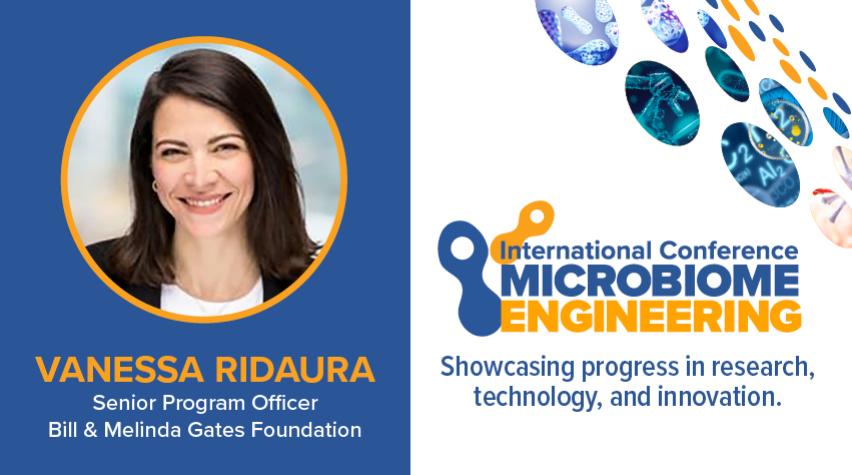
The 6th International Conference on Microbiome Engineering (ICME) brings together scientists across the quickly growing field of microbiome engineering. Held December 8–10, 2023 at the International House at UC Berkeley, the ICME’s program is unique from other microbiome conferences in that it specifically highlights the integration of engineering design principles with microbiome research. The conference integrates synthetic biology, systems biology, microbial ecology, and bioinformatics across a range of application spaces including the environment, manufacturing, food, and human health.
Vanessa Ridaura is a Senior Program Officer, Microbiome Products, at the Bill & Melinda Gates Foundation and a featured speaker at this year’s ICME. She shared with us about what she’ll be speaking about at the conference, some of the new and developing technologies that have influenced her research, and what she looks forward to at this year’s ICME.
What are you planning to talk about at the conference?
During the conference, I’ll touch on the efforts the Gates Foundation is undergoing to use microbiome interventions to impact maternal and child health all through the life course. From understanding how vaginal microbiome interventions can impact bacterial vaginosis to reduce the risk of HIV transmission and preterm birth, to studying how the maternal gut microbiome impacts placental and fetal development during pregnancy, and beyond. The multi-disciplinary team at the foundation is seeking ways to better introduce novel commodities to target geographies at scale to impact maternal and infant health and improve adverse pregnancy, birth, and infant outcomes.
What are some of the new and developing technologies that have been most impactful to your work?
One of the biggest challenges for the use of live biotherapeutic products in low- and middle-income countries (LMIC) is the need for antibiotics to “open a suitable niche” for their colonization and extended effect. In these target geographies, the microbiome is already very dysbiotic, and exposure to enteropathogens is prevalent.
In addition, the use of antibiotics for this application increases the risk of introducing an environmental reservoir of antimicrobial-resistant genes in the population, which can then make mothers and babies susceptible to severe pathogen infection that’s hard to treat with available therapies. Through synthetic biology, we are starting to understand how to create synthetic taxa with an engineered selective advantage, how to use CRISPR technologies to open niches without the need for antibiotic use, or how to identify key glycans that can be given in combination with bacterial formulations to improve maternal and infant gut health.
What are you looking forward to at this year’s conference?
I’m looking forward to learning how to best incorporate novel technologies to translatable products that can be scalable, economical, and introduced to LMIC geographies in the next 5–10 years.
About SBE
Established in 2004, the Society for Biological Engineering is a technological community for engineers and applied scientists integrating biology with engineering. Members of SBE come from a broad spectrum of industries and disciplines and share in SBE’s mission of realizing the benefits of bioprocessing, biomedical, and biomolecular applications. Learn more about SBE.
Learn more about the 6th International Conference on Microbiome Engineering.

